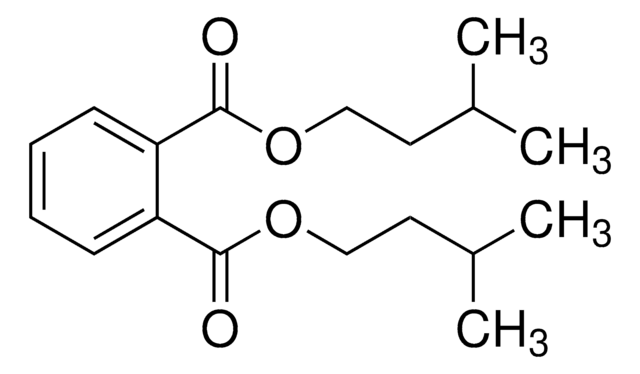41320
Dimethyl phthalate
PESTANAL®, analytical standard
Synonyme(s) :
DMP
About This Item
Produits recommandés
Qualité
analytical standard
Niveau de qualité
Gamme de produits
PESTANAL®
Pureté
≥99.5% (GC)
Température d'inflammation spontanée
1033 °F
Durée de conservation
limited shelf life, expiry date on the label
Technique(s)
HPLC: suitable
gas chromatography (GC): suitable
Indice de réfraction
n20/D 1.515 (lit.)
n20/D 1.516
Point d'ébullition
282 °C (lit.)
Pf
2 °C (lit.)
Densité
1.19 g/mL at 25 °C (lit.)
Application(s)
agriculture
cleaning products
cosmetics
environmental
food and beverages
personal care
Format
neat
Chaîne SMILES
COC(=O)c1ccccc1C(=O)OC
InChI
1S/C10H10O4/c1-13-9(11)7-5-3-4-6-8(7)10(12)14-2/h3-6H,1-2H3
Clé InChI
NIQCNGHVCWTJSM-UHFFFAOYSA-N
Vous recherchez des produits similaires ? Visite Guide de comparaison des produits
Description générale
Application
Autres remarques
The collision cross section (CCS) measurement was provided by Waters Corporation, using the SYNAPT XS mass spectrometer.
For a description and overview of how ion mobility enables the measurement of the CCS of an ion visit ims.waters.com.
Further information on the SYNAPT XS mass spectrometer can be found on the IMS microsite and product webpage.
TWCCS measurements are expected to be within 2% of this reference value.
P/N 41320 is part of the Waters Extractables & Leachables UNIFI scientific library which can be downloaded from Waters Marketplace.
Informations légales
Produit(s) apparenté(s)
Code de la classe de stockage
10 - Combustible liquids
Classe de danger pour l'eau (WGK)
WGK 1
Point d'éclair (°F)
294.8 °F - closed cup
Point d'éclair (°C)
146.0 °C - closed cup
Équipement de protection individuelle
Eyeshields, Gloves
Faites votre choix parmi les versions les plus récentes :
Déjà en possession de ce produit ?
Retrouvez la documentation relative aux produits que vous avez récemment achetés dans la Bibliothèque de documents.
Les clients ont également consulté
Notre équipe de scientifiques dispose d'une expérience dans tous les secteurs de la recherche, notamment en sciences de la vie, science des matériaux, synthèse chimique, chromatographie, analyse et dans de nombreux autres domaines..
Contacter notre Service technique







